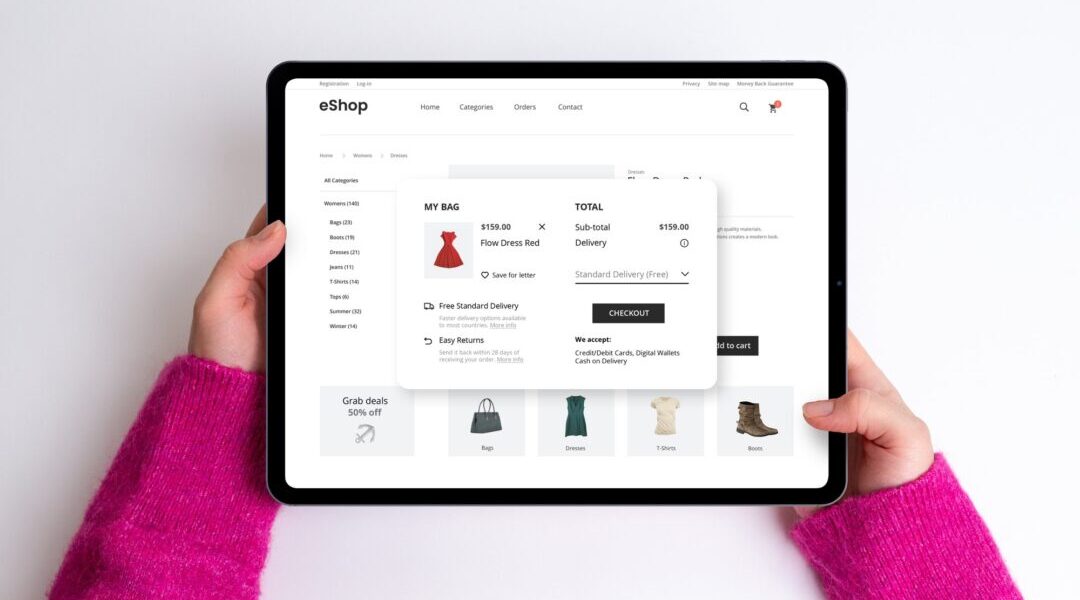Many business owners and decision makers don’t realize the critical role eCommerce platforms play in the success of a business. Selecting the right platform is a strategic decision that impacts growth, conversion rates, and customer satisfaction.
Before you migrate or set up your online business, conduct an eCommerce platform comparison. Doing so will help you determine which solution aligns best with your unique business needs.
Adobe Commerce Cloud, Salesforce Commerce Cloud, Shopify Enterprise, and commerce tools are four of the best enterprise eCommerce solutions on the market. In this guide, we stack these platforms against each other to identify their strengths. This eCommerce platform comparison will help you choose the most suitable solution to achieve your business goals.
Features and Functionality
You need robust eCommerce capabilities to deliver compelling shopping experiences, streamline operations, and drive growth. It’s critical to consider both the breadth and depth of platform features when making your choice. Here’s how the best enterprise eCommerce platforms compare.
Adobe Commerce Cloud
- Adobe Commerce offers a robust set of features for both B2C and B2B eCommerce. It includes tools such as quick checkout, multi-brand support, mobile optimization, and business reporting.

Salesforce Commerce Cloud
- The Salesforce platform presents comprehensive eCommerce capabilities. For instance, catalog management, merchandising, marketing automation, order management, and customer service. It also offers omnichannel commerce, personalization features, and AI-driven recommendations.
Shopify Enterprise
- Shopify Enterprise expanded with hundreds of new features to support both B2B and B2C features. As one of the most popular and user-friendly eCommerce platforms on the market, it provides an extensive set of tools for growing businesses. This includes storefront customization, multi-channel selling, inventory management, and built-in marketing tools.
- Its rich ecosystem of third-party apps further ensures you have everything you need to build a successful brand.
commercetools
- This headless commerce solution offers inventory and multi-channel management, built-in product information management (PIM), and reporting and statistics for valuable business performance insights. The platform supports both B2C and B2B eCommerce. However, be aware that to get the most out of this option, you’ll need some technical expertise.
Scalability and Performance
As your business grows, the eCommerce platform you choose must be able to handle increasing traffic, orders, and catalog sizes without any glitches or delays.
Adobe Commerce Cloud
- Adobe Commerce enables you to scale your product catalog easily with a layered, cacheable approach and a global reference architecture. You can then deploy incremental storefronts in multiple countries and create multichannel connected experiences as your operation expands. What’s more, these experiences can be customized with built-in support for localized currencies and languages.
Salesforce Commerce Cloud
- The architecture behind Salesforce Commerce is designed to accommodate millions of users. Known for its scalability and reliability, the eCommerce platform can handle high transaction and traffic volumes, scaling as rapidly as you require. It also provides global infrastructure and advanced caching to ensure optimal performance.
Shopify Enterprise
- Shopify was created with your business growth in mind. The platform offers robust scalability, so it can handle large product catalogs and high order volumes. In addition, it provides cloud-based hosting and content delivery network (CDN) support to ensure fast and reliable performance.
commercetools
- Designed to be both scalable and flexible, commercetools allows businesses to scale both horizontally and vertically. The microservices architecture also enables distributed deployment and dynamic resource allocation, so you see improved performance despite growth.
Customization and Flexibility
The level of customization and flexibility that eCommerce platforms offer significantly impacts your ability to differentiate your online business and create unique customer experiences.
Adobe Commerce Cloud
- Adobe Commerce Cloud gives merchants a high degree of flexibility. As an open-source platform, it offers extensive customization and integration capabilities.
- For instance, you can easily integrate APIs from any application, including Adobe and third-party solutions, into your tech stack. This empowers your team to quickly create and deploy customer experiences across any channel or device without relying heavily on IT resources.
Salesforce Commerce Cloud
- Salesforce Commerce provides considerable customization and extension capabilities. Developers can leverage JavaScript to create new features and modify existing ones using the platform’s APIs and hooks.
- The platform also allows you to design custom data models to accommodate specific business needs. What’s more, it enables you to customize the checkout, payment, and shipping processes.

Shopify Enterprise
- Shopify offers customization through its app ecosystem and Liquid templating language. You can build a custom online storefront, extend functionality through apps and APIs, and integrate third-party systems to align with your business needs.
commercetools
- Known for its flexibility, commercetools is highly customizable. With its API-first approach and microservices architecture, developers can build eCommerce experiences unique to your brand. The platform also supports a headless approach, which enables decoupled front- and back-end development.
Integration Ecosystem
The integration ecosystem of an eCommerce platform is a crucial consideration. Specifically, it determines the platform’s ability to connect with other critical business systems and technologies.
Adobe Commerce Cloud
- Adobe Commerce Cloud provides up to eight integration environments to streamline development and testing. These environments work seamlessly with your staging and production environments to ensure a smooth transition for your live store.
- The platform also integrates with existing commerce engines and applications. You can integrate with a range of robust tools to meet your business needs, such as payment gateways, shipping options, inventory management, and marketing.
Salesforce Commerce Cloud
- The eCommerce platform seamlessly integrates with external PIM, enterprise resource planning (ERP), and customer relationship management (CRM) systems. The same goes for other Salesforce products, such as Marketing Cloud, Sales Cloud, and Service Cloud.
- There’s also a comprehensive ecosystem of pre-built integrations available on the Salesforce AppExchange to enhance business capabilities.
Shopify Enterprise
- With literally thousands of apps to choose from in the Shopify App Store, you can easily integrate almost any additional function. For instance, payment gateways, shipping carriers, marketing tools, loyalty programs, accounting software, and staff management. Shopify makes it simple to expand business and store capabilities.
commercetools
- Through its API-first architecture, commercetools provides flexible integration options. The eCommerce platform supports third-party PIM, CRM, ERP, and content management systems, so you can tailor functionality to meet your needs.
Pricing and Total Cost of Ownership
The best eCommerce platforms for enterprises vary in the way they calculate pricing. Since every business has different needs, pricing will depend on your specific requirements and sales volume.
Adobe Commerce Cloud
- Adobe Commerce pricing is dependent on your annual average order value (AOV) and gross merchandise value (GMV). The platform offers a managed services package and a do-it-yourself option.
Salesforce Commerce Cloud
- Salesforce Commerce Cloud calculates pricing according to usage. It will depend on the size of your operation and platform requirements.

Shopify Enterprise
- Shopify offers tiered pricing plans with costs based on transaction volumes, features, and additional services. The pricing structure comprises a monthly subscription fee, which covers hosting and security, as well as transaction fees for payment processing. In general, a higher sales volume means lower transaction fees.
commercetools
- commercetools offers flexible pricing models based on usage, add-on services, and transaction volume. This enables businesses of all sizes to find a pricing plan that suits their requirements. Because you’ll need technical skills when using this platform, be sure to take developer fees into account.
Support and Resources
Comprehensive support, extensive documentation, and a robust ecosystem of resources are critical for the success of an eCommerce platform implementation.
Adobe Commerce Cloud
- The platform provides a wide range of resources, such as:
- Developer documentation
- Forums
- Adobe Commerce user guide
- Self-help knowledge base
- Ticket support
- Step-by-step guides from the Adobe Commerce support team
Salesforce Commerce Cloud
- Salesforce provides comprehensive support and resources through its extensive network of partners, developers, and customer success teams. It also offers training, developer documentation, and community forums to assist users.
Shopify Enterprise
- Shopify Plus for enterprises offers dedicated account managers, priority support, and 24/7 technical assistance for its customers. The platform also provides self-help tools, guides, and a community forum to support users.
commercetools
- commercetools provides tutorials, comprehensive developer documentation, software development kits (SDKs), and community support. Professional services and tailored support packages are also available for enterprise customers at an additional cost.
Choosing the Right eCommerce Platform to Achieve Your Goals
When choosing between eCommerce platforms, it’s crucial to carefully evaluate the solutions. Look at your specific requirements, budget, scalability needs, customization preferences, and integration ecosystem.
Salesforce Commerce Cloud offers a full range of business function integrations, while Shopify Enterprise provides an intuitive and user-friendly interface for rapidly scaling operations. Adobe Commerce is known for its flexibility, but its integration environments are limited.
commercetools offers a customizable, headless approach to eCommerce. However, you’ll need some technical help to make the most of this tool’s features.
Our team at Zobrist Software Group has extensive experience in eCommerce platform selection and implementation. We can help you compare the top platforms in detail and identify the one that best aligns with your business objectives, budget, and operational requirements. By leveraging the latest commerce trends, analytics, and payment technologies, we can create advanced eCommerce experiences that drive both growth and customer loyalty.
Are you ready to take the next step? Let’s chat about your eCommerce needs to find the right platform for your business.




